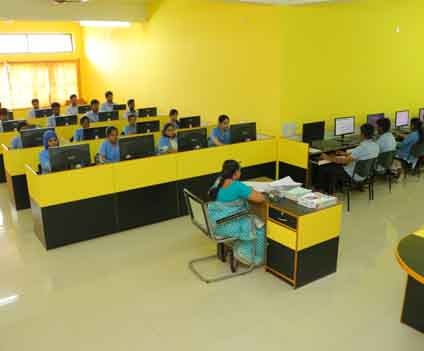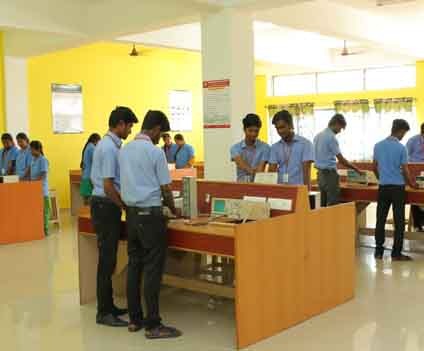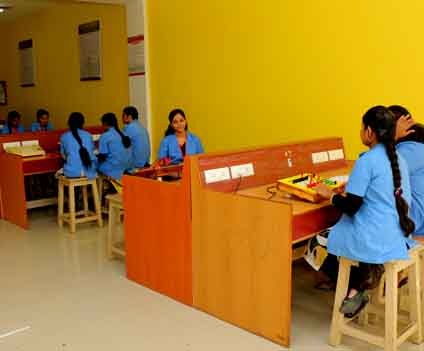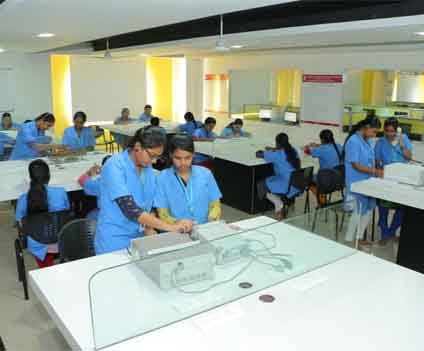
The Department of Electronics and Communication Engineering
About the Department
The department is recognized by the Pondicherry University as an Research Center where students can pursue their Doctoral degree. Emphasizing strong foundational knowledge, we strive to introduce intricate subjects in compelling and accessible ways. The department specializes in imparting technical expertise encompassing semiconductor devices, electronic circuit design, communication engineering, and their practical applications. Recognizing the nation’s vision for advancing the electronics manufacturing industry, we offer diverse training modules to foster the development of industry-ready engineers. Our focus remains on nurturing student competencies through multifaceted activities.

Further enhancing our academic resources, the Department maintains a dedicated library stocked with the latest titles, editions, journals, magazines, and internet connectivity. Organizing seminars, workshops, and guest lecturers is a regular practice aimed at augmenting the technical prowess of our students, preparing them for global competition. Additionally, collaborations through MoUs with esteemed entities like Vaayusastra Aerospace IITM, Research park, Kaivalya Tech Services, Kaivalya Technologies Pvt Ltd, Praya Labs, CORNERSTONE engineering solutions, and MAVEN SILICON enrich our curriculum with industry-oriented knowledge
The department provide extensive computing resources for research and education. The department has wireless internet connectivity via a campus wide-802.11b network to the laptops.
Department Vision and Mission
Vision
To emerge as a centre of excellence nurturing innovative engineers in Electronics and Communication technologies who can address global challenges through multidisciplinary approaches, sustainable solutions, and ethical leadership.
Mission
DM1: Impart Quality Education in the field of Electronics and Communication Engineering through experiential learning, project-based curricula, and digital pedagogy to create industry-ready professionals.
DM2: Foster research temperament by establishing state-of-the-art laboratories and innovation centers focusing on emerging technologies.
DM3: Enhance industry collaboration to facilitate internships, live projects, and technology transfer initiatives while promoting entrepreneurial mindset among students.
DM4: Develop socially conscious engineers capable of applying Electronics and Communication technologies for sustainable development and societal welfare.
Programme Educational Objectives (PEOs)
PEO1: Professional Excellence:
Graduates will be employed with professional competency in Electronics and Communication, demonstrating expertise in emerging technologies.
PEO2: Research and Innovation
Alumni will excel in research initiatives and entrepreneurial ventures and lead in technological innovation in emerging Electronics and Communication domains.
PEO3: Sustainability:
Develop and implement sustainable solutions in Electronics and Communication Engineering addressing global challenges while ensuring environmental responsibility and societal welfare.
PEO4: Ethics and Leadership:
Graduates will demonstrate ethical leadership in engineering teams while pursuing professional growth and contributing to the field through mentorship.
Program Outcomes
PO1: Engineering knowledge: Apply the knowledge of mathematics, science, engineering fundamentals, and an engineering specialization to the solution of complex engineering problems.
PO2: Problem analysis: Identify, formulate, review research literature, and analyze complex engineering problems reaching substantiated conclusions using first principles of mathematics, natural sciences, and engineering sciences.
PO3: Design/development of solutions: Design solutions for complex engineering problems and design system components or processes that meet the specified needs with appropriate consideration for the public health and safety, and the cultural, societal and environmental considerations.
PO4: Conduct investigations of complex problems: Use research-based knowledge and research methods including design of experiments, analysis and interpretation of data, and synthesis of the information to provide valid conclusions.
PO5: Modern tool usage: Create, select, and apply appropriate techniques, resources, and modern engineering and IT tools including prediction and modeling to complex engineering activities with an understanding of the limitations.
PO6: The engineer and society: Apply reasoning informed by the contextual knowledge to assess societal, health, safety, legal and cultural issues and the consequent responsibilities relevant to the professional engineering practice.
PO7: Environment and sustainability: Understand the impact of the professional engineering solutions in societal and environmental contexts, and demonstrate the knowledge of, and need for sustainable development.
PO8: Ethics: Apply ethical principles and commit to professional ethics and responsibilities and norms of the engineering practice.
PO9: Individual and team work: Function effectively as an individual, and as a member or leader in diverse teams, and in multidisciplinary settings.
PO10: Communication: Communicate effectively on complex engineering activities with the engineering community and with society at large, such as, being able to comprehend and write effective reports and design documentation, make effective presentations, and give and receive clear instructions.
PO11: Project management and finance: Demonstrate knowledge and understanding of the engineering and management principles and apply these to one’s own work, as a member and leader in a team, to manage projects and in multidisciplinary environments.
PO12: Life-long learning: Recognize the need for, and have the preparation and ability to engage in independent and life-long learning in the broadest context of technological change.
Programme Specific Outcomes (PSO)
PSO1: Products Development: Use modern tools to design subsystems for simple applications in Embedded Systems and VLSI.
PSO2: Design Thinking: Apply engineering concepts to find solutions in the fields of Communications, Signal/Image Processing.
Welcome Message
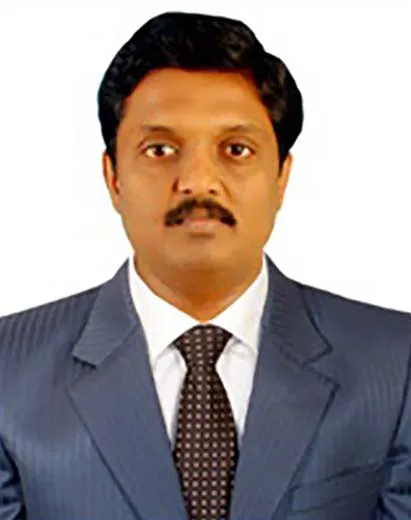
Dr.S.ARUNMOZHI,
Welcome to the Department of Electronics and Communication Engineering at Manakula Vinayagar Institute of Technology in Since its establishment, our department has grown significantly, now offering comprehensive programs including B.Tech, M.Tech, and Ph.D. courses. With a strong focus on research, innovation, and industry collaboration, we strive to stay at the forefront of technological advancements in areas like communication systems, signal processing, and embedded systems. We are committed to providing students with value-added courses, soft skill training, and industry-relevant knowledge, preparing them for successful careers and competitive exams. Join us as we empower the next generation of engineers to create innovative solutions for the future!
Programs
Department of Electronics and Communication Engineering
The Department of Electronics and Communication Engineering at Manakula Vinayagar Institute of Technology offers a B.Tech in Electronics and Communication Engineering, an M.Tech in Electronics and Communication Engineering, and a Ph.D. in Electronics and Communication Engineering, with a focus on cutting-edge communication technologies and innovative solutions in signal processing and embedded systems.
Placements
We are pleased to present our students who have gained positions with top recruiting firms, demonstrating their talent and the high level of education and training they get in our department. Our extensive industry connections and comprehensive placement help ensure our alums have successful careers with top companies.
Batch Wise Placement Statistics (click below to view pdf )
2020-2024, 2019-2023, 2018-2022, 2017-2021, 2016-2020, 2015-2019, 2014-2018, 2013-2017, 2012-2016, 2011-2015, 2010-2014, 2009-2013, 2008-2012Achievements
We are proud to highlight the remarkable achievements of our Department. Both students and faculty have consistently excelled in academics, research, and industry collaboration, earning numerous awards, grants, and recognitions. Key achievements include successful partnerships with leading food industry organizations, innovative research publications, and high placement rates in renowned companies within the food technology sector.
Faculty
The department has dedicated faculty who interact closely with alumni in academia and industrial personalities in order to make the programmes to meet the aspirations of different stack holders. They have a strong skill in the latest technologies and are ready to deliver their acquired knowledge. The committed team of faculty members are dextrous in mentoring and counseling students and guiding them to success. They are highly engaged in research and have many publications.
Events
Program Outcome Attainment- UG
Program Outcome Attainment- PG
Course Outcome
MoU
| Sl:No | Company Name | Activity | Date | Participants |
| 1 | Vaayusastra Aerospace IITM, Research park, Taramani, Chennai-113 | MOU Signed | 18.03.2023 | Students and Faculties |
| Guest Lecture | 18.03.2023 | II year | ||
| Workshop | 19 & 20 04.2023 | ECE students | ||
| 2 | Kaivalya Tech Services Puducherry-605 001 | MOU Signed | 20.03.2023 | Students and Faculties |
| Guest Lecture | 20.03.2023 | II year | ||
| 3 | Praya Labs | MOU Signed | 23.11.2022 | Students and Faculties |
| Guest Lecture | 23.11.2022 | II Year | ||
| Workshop | 05 & 06. 04.2023 | II Year and III year | ||
| 4 | CORENERSTONE | MOU Signed | 23.09.2020 | Students and Faculties |
| 5 | MAVEN SILICON | MOU Signed | 22-09-2021 | III year |
Infrastructure
The department provides extensive computing resources for research and education. The department has wireless internet connectivity via a campus-wide 802.11b network to the laptops.
BoS

If you have any inquiries regarding the department, please feel free to reach out to us. We are here to assist you with any questions or information you may need.
Dr.S.ARUNMOZHI, Professor & Head,
Department of Electronics and Communication Engineering,

